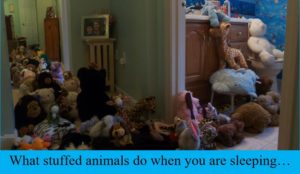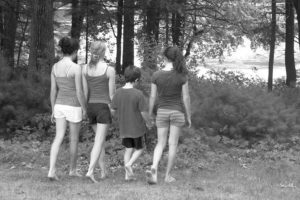Program Description
The Bellingham Public Library offers a different take on the traditional scavenger hunt. The Digital Scavenger Hunt is a program that tests the creativity of families. For each Digital Scavenger Hunt, there are a selected number of items or themes for families to find or create and take photographs of. These challenges are multi-outcome and purposely vague, such as “Something That Makes You Happy,” “What Stuffed Animals Do When We Are Sleeping,” and “Nature.” Families interpret each challenge in their own ways and take photographs that are relevant to them. Within the allotted amount of time (days or weeks), the participating families send in their photos via email, online sharing, or put them on a USB drive. At the end of the program, the librarians compile the photos and invite the families to the library to watch a slideshow of all the participants’ photographs.

This is a multi-user program. Adults are involved in the scavenger hunt from a logistical sense (driving the family to a particular location, taking the photos and sending them in) and also in a creative sense (facilitating the discussion about ideas for solving the challenges, and posing for the photos taken by the kids). Conversation is a key part of this program since families need to discuss their game plan for meeting each challenge. The program is a great opportunity for families to create memories while working together on an unusual and fun task. One bonus is that after the scavenger hunt is over, the families have some great photographic evidence of all the fun they had. Librarians hope that the Digital Scavenger Hunt is a jumping off point for families to seek out activities that promote family bonding and relationship-building on their own.
Registration and Facilitation
Families must register online to participate so the librarians can email them an information sheet with the challenges and rules. Families work independently, at their own pace to think of ways to meet each challenge, then take the appropriate photograph. The main catch is that someone in the family needs to be in each photo which promotes intergenerational interaction. Since this isn’t a traditional facilitated drop-in program, the role of staff is more behind-the-scenes, while the families are more active. Librarians come up with the Digital Scavenger Hunt challenges, promote the program, relay the information to the participants, send reminders of the deadline along the way, and compile the images into a slideshow to share. Families can stop by the library to learn about the program and see photos that other families took during previous scavenger hunts.
Tips and Advice
Librarians have done some prototyping of the amount of challenges for each scavenger hunt, and the amount of time the families have to complete them. Librarians have tried running the program over one month, two weeks, one week, and even one day. Because it can be a time commitment for families, librarians haven’t found the perfect combination yet. One piece of advice to keep in mind is that you have to be flexible and accessible to different families. There may be no perfect combination- what works for one family simply might not work for another family, and what is good for one community might not be good for another. Librarians at Bellingham Public Library believe it’s important to have as few rules as possible to encourage, rather than stymie, creativity. The only main rules for the Digital Scavenger Hunt are: 1.) for every picture, at least part of at least one family member must be visible, and 2.) have fun!
Special thanks to Steve Fowler, Youth Services Librarian at the Bellingham Public Library https://www.bellinghamma.org/library
![]()
